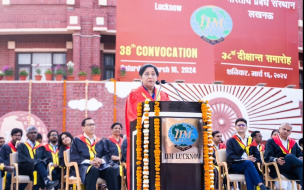To help you in the decision-making process, we’ve broken down the pros and cons of online MBAs in India, from the cost to the learning resources available.
Advantages of an online MBA in India
There are many advantages to choosing online MBAs in India over in-person programs.
1. Cost efficiency
Online MBA programs in India typically offer lower tuition fees than their on-campus counterparts.
For instance, the top-ranked college for MBAs in India is the Indian School of Business, where tuition costs INR 354,000 (US $4,300). By contrast, the online MBA at Narsee Monjee Institute of Management Studies costs just INR 144,000 (US $1700).
As well as reduced tuition fees, an online MBA in India can also be more cost-efficient because it eliminates the extra expenses that come with on-campus study. These include commuting, accommodation fees, and textbooks.
2. Flexibility
Full-time traditional MBA programs demand a significant time commitment, usually two years of full-time, on-campus study. This requires that most students quit their jobs and forfeit their earning potential for the duration of the program. This can be challenging for those with family or other commitments.
Online MBAs, on the other hand, usually provide considerable flexibility in scheduling, with the option to watch recorded lectures and study in the evenings.
This enables students to manage their family commitments and continue earning alongside their studies, further alleviating financial pressure.
3. Accessibility
Enrolling in a traditional program may require relocation to the city where the institution is situated, incurring inconveniences and additional expenses.
Online MBA programs transcend geographical boundaries, enabling students from across India to access a wide range of universities and specializations without the need for relocation.
4. Diverse learning resources
Finally, online MBA programs leverage digital resources to offer a rich array of multimedia content, recorded lectures, and interactive simulations, enhancing the learning experience.
For example, the specialized online MBA in FinTech and cybersecurity at IIT Jodhpur offers a blend of online and in-person learning components covering a range of topics, including managerial economics, managing digital enterprises, and trends in FinTech.
Disadvantages of an online MBA in India
Like any program format, online MBA programs also have their disadvantages. Here are the key issues to be aware of when considering an online MBA program in India:
1. Networking challenges
Traditional MBA programs facilitate in-person networking by bringing diverse professionals together into the classroom to work on business problems. Outside the classroom, the on-campus experience is enriching, offering a vibrant campus life, access to libraries, clubs, and extracurricular activities that contribute to personal and professional growth.
Without the built-in classroom networking of traditional programs, networking in a virtual learning environment can be more challenging.
However, this depends on the program itself, as many online MBAs offer virtual networking portals and the chance to connect with peers in online classes.
2. Self-motivation demanded
Traditional MBA programs often offer a comprehensive curriculum that includes hands-on projects, case studies, and real-time interactions with industry experts, equipping students with practical skills and knowledge. The high level of face-to-face interaction involved can create a stronger network of accountability for students to lean on as they study.
Online learning necessitates a high degree of self-discipline and motivation. Students must effectively manage their time and remain committed to their studies without the structure of a physical classroom.
3. Credibility concerns
Some employers may still view online degrees as less credible than traditional ones. However, this perception is evolving as more reputable institutions offer online MBA programs.
The 2023 Corporate Recruiter’s Survey conducted by the Graduate Management Admission Council (GMAC) found that recruiters around the world say they value online degrees equally to in-person programs. However, when quizzed about the interpersonal skills gained in online programs, employers were skeptical.
This suggests that although traditional MBAs may still hold a slight edge in terms of credibility, the skills of the individual matter more than the format. Attending a reputable university can also offset the credibility gap.
What is the value of online MBAs in India for your career?
Your post-degree outcomes from an online MBA in India, including salary and employment, ultimately depend on a multitude of factors. These include the institution's reputation, your skills, and the job market. Both online and in-person formats can lead to lucrative career opportunities if pursued from reputable institutions.
Professor Kunal K Ganguly is the dean of development at the Indian Institute of Management Kashipur. He says, "The online MBA is helpful for participants to go for higher education and blend theory with education without compromising on their present jobs and assignments.”
He stresses the importance of choosing programs that blend management education with newer skillsets like analytics, as well as blended learning modes.
“It is expected that higher education institutions explore the hybrid mode of offering education both in online and offline form to leverage the advantages of both modes,” he says.
Which universities are best for online MBA in India?
Examples of online MBA programs in India include:
- Symbiosis Centre for Distance Learning (SCDL): SCDL offers a highly regarded online MBA program with various specializations.
IGNOU (Indira Gandhi National Open University): IGNOU provides a flexible and affordable online MBA program, making it accessible to a wide range of students.
Amity University Online: Amity University offers an online MBA with several specializations and a strong focus on e-learning.
ICFAI Business School
IMT Ghaziabad (Institute of Management Technology, Centre for Distance Learning): IMT Ghaziabad's distance learning MBA program is well-regarded.
Annamalai University DDE (Directorate of Distance Education): Annamalai University offers an online MBA program that is recognized for its quality.
IGNOU (Indira Gandhi National Open University): IGNOU provides a flexible and affordable online MBA program, making it accessible to a wide range of students.
NIBM (National Institute of Business Management): NIBM offers online MBA programs with various specializations and a focus on industry-relevant curriculum.
Welingkar Institute of Management Development and Research – Distance Learning: Welingkar offers online MBA programs with a blend of classroom and online learning.
DY Patil Online University – DY Patil University Online
Is an online MBA in India right for you?
Ultimately, the decision about whether an online MBA in India is right for you hinges on your individual circumstances and career objectives. Both paths have their merits, and making the right choice is paramount in navigating this ever-evolving educational landscape.
It is important firstly to think about your financial situation and your accessibility requirements. You should also look carefully at whether your online MBA teaches digital skills and how those lessons are delivered, prioritizing a range of teaching formats.







